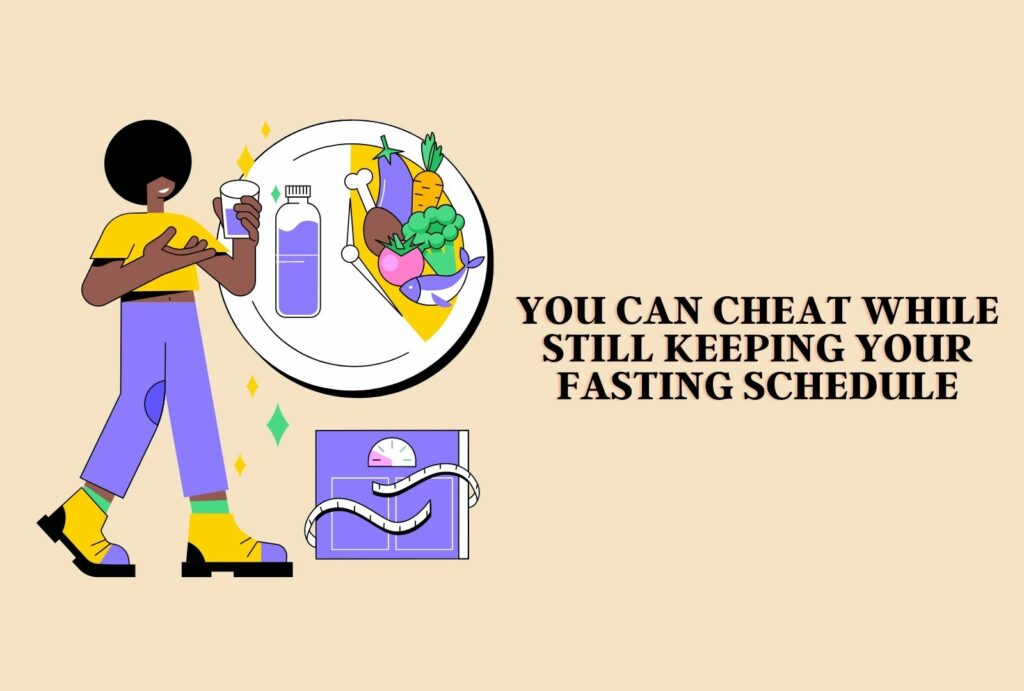
Intermittent fasting has become a popular approach to weight loss and improved health in recent years. This approach involves restricting food intake to specific windows of time and allowing the body to go without food for extended periods. However, many people wonder if they can have a cheat day on intermittent fasting. Here’s what you need to know:
1. What is a cheat day?
A cheat day is a day where you intentionally break the rules of your diet or eating plan. This often involves indulging in high-calorie or high-carbohydrate foods that are not typically allowed on the plan. Some people use cheat days as a way to reward themselves for sticking to their diet, while others see them as a necessary break from strict eating patterns.
2. Can you have a cheat day on intermittent fasting?
The answer is not straightforward. On the one hand, intermittent fasting allows for some flexibility in eating patterns, and some people may find that they can still achieve their weight loss goals even with occasional indulgences. However, it’s important to remember that the benefits of intermittent fasting come from giving your body extended periods of time without food. If you’re consuming large amounts of high-calorie or high-carbohydrate foods on your cheat day, you may be undoing the progress you’ve made during your fasting periods.
3. Alternatives to cheat days:
Rather than having a cheat day, some people find it more helpful to have a cheat meal or to incorporate occasional treats into their regular eating patterns. This approach can help satisfy cravings and prevent feelings of deprivation without completely derailing progress. Additionally, some people may find that they don’t need a cheat day or cheat meal at all and can maintain their weight loss goals without indulging in high-calorie or high-carbohydrate foods.
4. Consider your goals and preferences:
Ultimately, whether or not you have a cheat day on intermittent fasting depends on your goals and preferences. If you feel that occasional indulgences help you stay motivated and on track, then a cheat day may be a viable option. However, if you find that cheat days lead to overeating or negative feelings about food, then it may be better to avoid them altogether.
In conclusion, while it’s possible to have a cheat day on intermittent fasting, it’s important to consider the potential impact on your weight loss goals and overall health. Alternatives to cheat days, such as cheat meals or occasional treats, may be more sustainable and effective for some people. Ultimately, the best approach is to find an eating plan that works for your individual needs and preferences and that you can maintain over the long term.
Can You Have a Cheat Day While You’re Intermittent Fasting?
Intermittent fasting has gained popularity as an effective way to lose weight and improve overall health. However, one of the most commonly asked questions is whether one can have a cheat day while intermittent fasting. In this article, we’ll discuss the concept of a cheat day, how it affects intermittent fasting, and the pros and cons of incorporating one into your intermittent fasting routine.
1. What is a cheat day?
A cheat day is a designated day where you temporarily deviate from your regular diet and eat whatever you want. It’s often viewed as a reward for sticking to a diet for an extended period of time. During a cheat day, individuals typically indulge in high-calorie or high-carbohydrate foods that are not typically allowed in their diet.
2. Can you have a cheat day while intermittent fasting?
The answer is not straightforward. Intermittent fasting requires a caloric deficit, which can be difficult to achieve if you consume large amounts of high-calorie or high-carbohydrate foods during a cheat day. Additionally, consuming large amounts of food in a single day may affect your overall progress and weight loss goals. Therefore, it’s important to approach cheat days with caution and moderation.
3. Pros of incorporating a cheat day:
Some people find that incorporating a cheat day into their intermittent fasting routine helps them stay on track and maintain their diet over a longer period of time. A cheat day can also help satisfy cravings, which may otherwise lead to overindulgence or binge eating. Finally, it can provide a mental break and relieve feelings of deprivation, which can help maintain motivation and adherence to the diet.
4. Cons of incorporating a cheat day:
One of the biggest cons of incorporating a cheat day while intermittent fasting is that it may slow down your progress or even reverse your weight loss. Additionally, the effects of a cheat day may linger beyond that day, leading to unhealthy eating habits or even binge eating. Finally, cheat days can also lead to feelings of guilt, which can negatively affect your mental health.
In conclusion, while it’s possible to incorporate a cheat day into your intermittent fasting routine, it’s important to approach it with caution and moderation. A cheat day can help relieve feelings of deprivation, but it can also affect your weight loss progress and lead to unhealthy eating habits. Therefore, it’s important to consider the pros and cons of a cheat day and assess whether it aligns with your personal goals and values. Ultimately, the best approach is to find an eating plan that works for your individual needs and preferences and that you can maintain over the long term.
You Can Cheat While Still Keeping Your Fasting Schedule

Intermittent fasting is a popular way of eating that has been proven to help with weight loss, improve metabolism and reduce the risk of chronic diseases. However, many people wonder if they can cheat while still keeping their fasting schedule. The answer is yes, you can still have a cheat day while adhering to an intermittent fasting schedule. In this article, we’ll discuss how you can cheat while still sticking to your fasting schedule and how to do it without ruining your progress.
1. Plan ahead:
If you know you’re going to have a cheat day, it’s important to plan ahead and schedule it on a day when it won’t negatively affect your fasting schedule. For instance, if you’re following a 16/8 fasting schedule, you can have your cheat day on the day you break your fast. This way, you can enjoy your favorite foods without ruining your progress.
2. Choose your cheats wisely:
When you do have a cheat day, it’s important to choose your cheats wisely. Rather than indulging in high-calorie and high-carbohydrate foods, try to focus on foods that are still relatively healthy and nutritious. For instance, you can have a slice of pizza with lots of veggies or a small bowl of pasta with a tomato-based sauce.
3. Practice portion control:
Even if you’re having a cheat day, it’s important to practice portion control. Don’t go overboard with your eating or you may end up undoing all of the progress you’ve made. Try to eat slowly and mindfully, and stop eating when you’re full.
4. Get back on track the next day:
Finally, it’s important to get back on track the day after your cheat day. Stick to your regular fasting schedule and avoid overindulging. The sooner you get back on track, the easier it will be to maintain your progress.
In conclusion, it is possible to have a cheat day while still adhering to an intermittent fasting schedule. However, it’s important to plan ahead, choose your cheats wisely, practice portion control, and get back on track the day after your cheat day. If done in moderation, a cheat day can help you stay on track and make it easier to adhere to your fasting schedule over the long term. Remember, the key to success with intermittent fasting is consistency, so it’s important to find a balance that works for you and that you can maintain over time.
Can a Cheat Day Ruin Your IF Weight-Loss Progress?

Intermittent fasting has become a popular approach to weight loss and overall health improvement. One of the biggest advantages of intermittent fasting is that it allows people to enjoy their favorite foods without having to count calories or worry about portion control. However, many people wonder if having a cheat day can ruin their progress. In this article, we will explore the potential effects of a cheat day on your weight loss progress and how to minimize any negative impacts.
1. The impact of a cheat day:
While a cheat day can be a great way to indulge in your favorite foods and satisfy your cravings, it can also derail your weight loss progress. The extra calories and carbohydrates consumed on a cheat day can cause your body to store more fat and slow down your metabolism. This can make it more difficult to continue losing weight and reaching your goals.
2. The importance of moderation:
The key to having a cheat day while on intermittent fasting is moderation. It’s important to keep in mind that one cheat day won’t ruin your progress, but overindulging frequently can have a significant impact on your weight loss journey. Try to limit your cheat days to once a week or less, and make sure to keep your indulgences in moderation.
3. The timing of your cheat day:
Another factor that can affect the impact of a cheat day on your weight loss progress is the timing of your cheat day. If you have a cheat day on the same day you break your fast, it may be easier for your body to process the extra calories and carbohydrates. On the other hand, having a cheat day on a fasting day may have a more significant impact on your progress.
4. Getting back on track:
If you do have a cheat day, it’s important to get back on track as soon as possible. Stick to your regular fasting schedule the following day and avoid overindulging. Consistency is key when it comes to intermittent fasting, so getting back on track quickly will help you maintain your progress.
In conclusion, a cheat day can have an impact on your weight loss progress while on intermittent fasting. It’s important to indulge in moderation, limit your cheat days to once a week or less, and be mindful of the timing of your cheat day. By following these tips and getting back on track quickly, you can enjoy your favorite foods without derailing your progress towards your weight loss goals. Remember, the key to success with intermittent fasting is consistency, so find a balance that works for you and stick to it.
Day After a Cheat Day
Intermittent fasting has become a popular approach to weight loss and overall health improvement. One of the biggest advantages of intermittent fasting is that it allows people to enjoy their favorite foods without having to count calories or worry about portion control. However, after a cheat day, it’s important to get back on track and stay committed to your fasting schedule. In this article, we will explore the importance of the day after a cheat day and how to minimize any negative impacts.
1. Avoid overindulging:
After a cheat day, it can be tempting to continue indulging in your favorite foods. However, it’s important to avoid overindulging and get back on track with your fasting schedule as soon as possible. Stick to your regular fasting schedule and avoid eating any more than you need to.
2. Drink plenty of water:
Drinking plenty of water after a cheat day can help to flush out any toxins and excess fluids in your body. It can also help to reduce any bloating or inflammation that may have occurred as a result of your cheat day.
3. Eat healthy, nutritious meals:
After a cheat day, it’s important to focus on eating healthy, nutritious meals. Incorporate plenty of fruits and vegetables, lean protein, and healthy fats into your diet to help you stay satisfied and energized throughout the day. This can also help to minimize any negative impacts of your cheat day and keep you on track with your weight loss goals.
4. Get some exercise:
Getting some exercise the day after a cheat day can help to boost your metabolism and burn off any extra calories you may have consumed. Even a short walk or light workout can make a difference and help you feel more energized and focused throughout the day.
In conclusion, the day after a cheat day is an important time to get back on track and stay committed to your fasting schedule. Avoid overindulging, drink plenty of water, eat healthy, nutritious meals, and get some exercise to help minimize any negative impacts of your cheat day. By staying committed and consistent with your fasting schedule, you can continue to reach your weight loss goals and improve your overall health and well-being. Remember, intermittent fasting is a lifestyle change, not a quick fix, so be patient and stay committed to your journey.
Final Words
Intermittent fasting has become a popular lifestyle approach to weight loss and improved health. While it can be challenging to commit to a fasting schedule, the benefits of intermittent fasting are numerous. However, one of the biggest concerns people have about intermittent fasting is whether or not they can have a cheat day. While it’s possible to indulge in your favorite foods while still maintaining your fasting schedule, it’s important to be mindful of the impact a cheat day can have on your progress.
Overall, incorporating a cheat day into your intermittent fasting routine can be a great way to indulge in your favorite foods without completely derailing your progress. However, it’s important to approach a cheat day with mindfulness and intention. Rather than bingeing on junk food, try to incorporate healthier versions of your favorite foods, or enjoy a single indulgent meal rather than an entire day of overeating.
It’s also important to remember that a cheat day does not have to be a complete departure from your fasting schedule. Consider extending your fasting window the day after a cheat day to help balance out any additional calories consumed. And, make sure to stay hydrated, focus on nutrient-dense foods, and get some exercise to help minimize any negative impacts.
At the end of the day, the most important thing to keep in mind is that intermittent fasting is a lifestyle change, not a quick fix. While a cheat day can be a fun and indulgent way to break up your fasting routine, it’s important to stay committed and consistent with your overall goals. With the right mindset and approach, incorporating a cheat day into your intermittent fasting routine can be a sustainable and enjoyable way to achieve your health and weight loss goals.
In conclusion, intermittent fasting can be an effective and sustainable approach to weight loss and improved health. While a cheat day can be a fun way to indulge in your favorite foods, it’s important to approach it with mindfulness and intention to minimize any negative impacts on your progress. With the right mindset and approach, intermittent fasting with a cheat day can be a healthy and enjoyable lifestyle change.